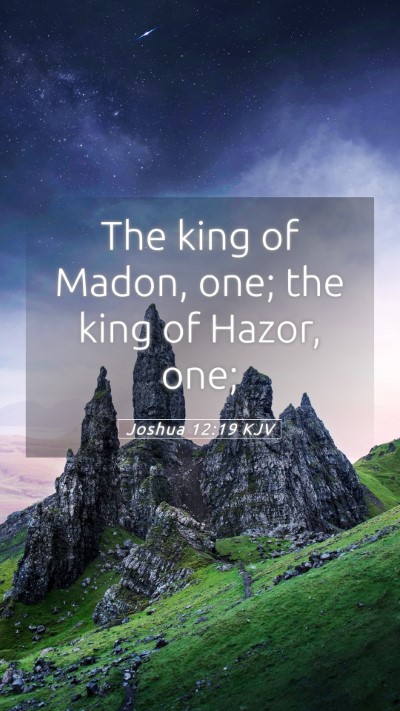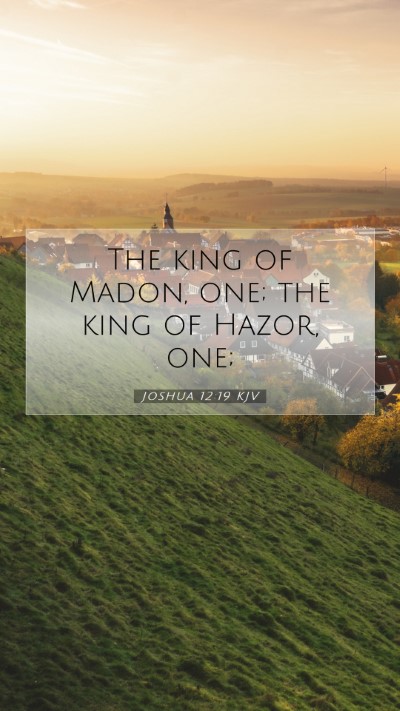Understanding Joshua 12:19
Verse: "The king of Hormah, one; the king of Arad, one;" (Joshua 12:19)
In this verse, we find a succinct list of conquered kings, which serves to highlight the overall victories of the Israelites under Joshua's leadership. This verse encapsulates a significant portion of the narrative regarding the conquest of Canaan and the fulfillment of God's promises to His people. Below, we explore the interpretations and meanings drawn from esteemed public domain commentaries.
Division of the Conquered Kings
The mention of these specific kings—Hormah and Arad—can be unpacked in several layers:
- Historical Context: Joshua's conquests are seen as a culmination of the Israelites' journey through the wilderness and their claim to the Promised Land.
- Spiritual Application: Each king represents opposition that was overcome by faith and obedience, emphasizing the importance of trusting God in our battles.
- Geographical Significance: Hormah, in particular, is associated with a place of total destruction, indicating that sin and resistance to God lead to demise.
Commentary Insights
Matthew Henry's Commentary: Henry elaborates on this passage by emphasizing that the listing of the defeated kings is not merely for record-keeping but serves to illustrate the power of God in delivering the land to Israel. He views it as a reminder of the faithfulness of God to His covenant and a prompt to the faithful regarding the consequences of rebellion against Him.
Albert Barnes: Barnes notes that the kings represent different forms of opposition encountered on the path to divine inheritance. This commentary suggests that understanding such resistances is vital for anyone pursuing a life of faith. The isolation of kingly figures indicates a pattern in spiritual warfare where the adversaries, though different in nature, ultimately fall before God's sovereignty.
Adam Clarke: Clarke takes a slightly different angle by focusing on the significance of names. He explains that Hormah has historical ties to the events prior to this conquest, where the Israelites faced defeat. Thus, its mention here serves as a stark reminder of God's redemptive power and the context of hope that undergirds Israel's past failures and eventual successes.
The Broader Implications
From a broader theological perspective, Joshua 12:19 encapsulates themes of:
- Divine Promises: The conquests symbolize the fulfillment of the promises God made to Abraham, Isaac, and Jacob regarding the land.
- Faith and Perseverance: The faithful obedience of the Israelites in conquering these kingdoms reflects the necessary attitude for believers in every generation.
- Symbolism of Kingship: The dethroning of these kings serves as a metaphor for spiritual authority; believers are to recognize Christ's ultimate lordship over every opposing force.
Application of Joshua 12:19
As Christians seek to apply this verse and its meanings practically, several points of application emerge:
- Identifying Personal Battles: Reflect on personal "kings" that need to be conquered in one’s life—addictions, fears, or doubts.
- Encouraging Faith in God: Understand that no opposition is too great if one remains steadfast in faith and obedience.
- Community Reflection: Engage with your community, discussing how collective efforts in faith can lead to overcoming challenges.
Related Bible Cross References
- Judges 1:17: Highlights the conquest of Hormah and its significance in the ongoing narrative of Israel's settlement.
- Numbers 21:1: Discusses the initial victories and the context of Israel's battles against their enemies.
- Hebrews 11:33-34: Recognizes faith as the force that tabulates victories against kingdoms, a direct connection to the narrative of Joshua's conquests.
Conclusion
Joshua 12:19 stands as a testament to the victories won by faith and divine support. By studying this verse, believers can gain profound insights into God's unwavering faithfulness and how they can apply these lessons in their everyday lives. The study of this scripture not only enriches one's understanding of historical events but also fosters a deeper relationship with God through its application in personal and communal faith journeys.


